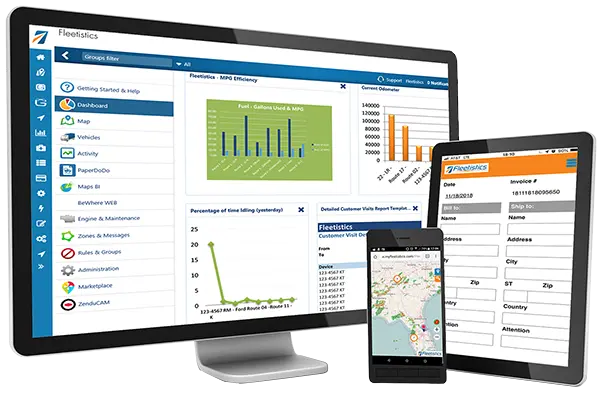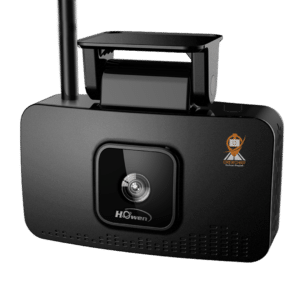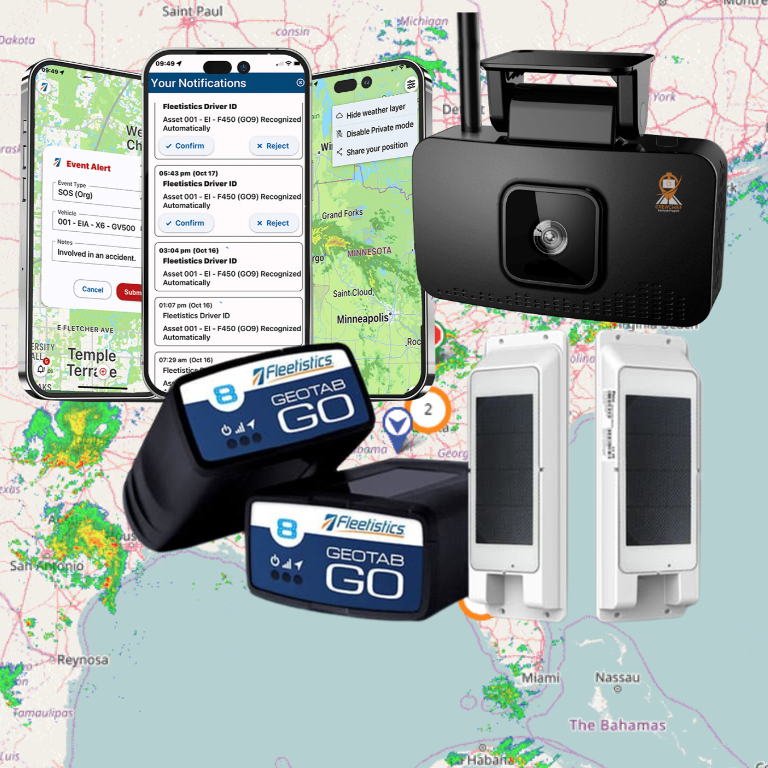How Vehicle Tracking Gets Off Track
Many vehicle tracking system implementations fail because of an inadequate commitment by management to a process of preparation, planning, and training. The result of implementation failure is often very expensive and includes:

- Low return on investment
- Late or slow deployment
- Being over budget
- GPS system failure or bad data due to tampering or poor quality installation
- System not used after evaluation period
- Employee or lower management rebellion over being held accountable
- Managements unwillingness to hold people accountable for behavior changes
- Poorly written RFPs
You can learn from the mistakes of others and use that experience to avoid the pitfalls; instead reap the rewards of vehicle tracking technology and the Fleetistics SEP process.
1. Lack of Top Management Commitment
To often senior managers decide to delegate the oversight of a GPS tracking implementation project to lower management or admin staff. This often results in being out of touch with critical events, or the lack of understanding of the size, scope, and technical aspects of the project. Subsequently, the lack of proper commitment of time and resources required for a successful implementation results in a lower than possible outcome.
Solution: High visibility among stakeholders, regular meetings, follow the process. Schedule internal meetings 2 times a month to review progress and tasks being accomplished. Review the data as soon as possible and train, train, train at all levels.
2. No Definition of Success
If X is achieved, the project is a success and the investment is justified. This simple statement overrides all other considerations. It is a statement everyone can read and understand. It is a mission statement for a vehicle tracking project from which the project is built to determine if and how the mission can be accomplished.
Solution: Senior management should meet with the project team and focus group to define and agree on the mission. Something drove the idea of looking into a fleet management system so use this as the starting point to define the mission statement.
3. Poor Product Selection
Poor product selection occurs when a company does not really understand what it is trying to accomplish. This is made worse when the company does not really understand what a vehicle tracking and management system can do. It also occurs when staff members assigned to the project do not take the time to learn and use the new system as they would after deployment to understand the if the solutions features are adequate for their needs.
Another reason is managers, familiar with vehicle tracking systems from a previous job, implement the same GPS system in their new company without defining requirements to reviewing the market. Companies have made major gaffes by selecting a package at the top levels of a company without knowing its characteristics in relation to all levels of the company because they know someone. What often results from this is the fleet management system does not fit the organizational needs, or the vehicle tracking solution takes more time to use than can be accomplished along with daily work tasks.
Solution: Ensure proper discover is conducted to understand customers operations beyond what they define as their top issues so you can customize a solution to improve ROI in multiple areas. Training and working with multiple levels of an organization to determine how the data can solve operational issues, improve customer service, increase efficiency and improve profitability.
4. Unclear Project Goals Define Success
Unclear goals for FMS implementation with no specific ROI expectations cause difficulties. Without clear goals, project leadership becomes confused and employees resistance becomes troublesome.
Solution: Agree to the definition of success before the evaluation and share this with your potential partners. Partners appreciate a clear vision and can reduce wasted time if a win-win relationship is not possible based on the mission. This process leads to the natural conclusion of placing an order with confidence.
5. Inadequate Resources
FMS implementations fail due to inadequate resources. Many companies will attempt to save dollars by doing everything themselves on an overtime basis, whether or not there are adequate skills and time within the company. People burn out after having put in extensive hours over time. Instead the implementation should be treated as an upgrade to the company infrastructure that is necessary to maintain or gain a strategic and competitive advantage.
Solution: Fleetistics highly recommends a salaried program manager for every 500-750 vehicles depending on the skills, corporate culture and technology utilized by the customer. Fleetistics managed services can also assist.
6. Resistance to Change/Lack of Buy-in
Lack of a change management approach as part of the program can prevent the fleet program from succeeding. Resistance to change is quite often caused by (1) A failure to explain why, (2) Lack of involvement by those responsible for working with the drivers (3) Inadequate communication (4) Lack of visible top management support and commitment, and (5) Arrogance. A lack of buy-in often results from not getting end-users involved in the project from the very start, thereby negating their authorship and ownership of the new system and processes. Drivers and field managers can become so anxious that they sabotage the system.
Solution: Consult with internal customers to ensure they take the proper steps to implement change management. Fleetistics does not do the change management as it is important for employees to see their management in a leadership role. Second, lead by example and apply the same rules to employees and management. In it together and leading by example approaches.
7. Misfit with Business Processes
The misfit with the company business processes and existing software applications can also cause difficulties. This failure to examine underlying business process flaws, and integrate the FMS application with the business processes, causes loss of productivity and time, and ultimate benefits. What fleet maintenance, logistics, or dispatching applications are in use and can these be integrated with the fleet management solution?
Solution: Understand a wide variety of functional areas of the customers operation. The Solution Survey can assist with uncovering potential issues that reduce the impact of the investment.
8. Unrealistic Expectation of Benefits and ROI
Unrealistic expectation of benefits and return on investment cause issues. Vendors are notorious for overstating the benefits in terms of ROI, while the total costs of the project is too often understated. When this happens, a company does not stand a chance of achieving the ROI it anticipated.
Solution: Integrity at all times. Lies of commission and omission. Know your product and service. Never guess and avoid absolute terms that offer no alternatives such as always and never. Few things in life are absolute and being honest is key.
9. Inadequate Training and Ongoing Education
Inadequate training and ongoing education is a reason for long term failure. FMS-related training is crucial as many employees must learn new interfaces and business processes which affect the operation of the entire fleet operation. The corporate culture is impacted by changes in the companies business processes, and shortchanging this part of the FMS implementation leads to much pain and suffering downstream.
Solution: Educate customer on resources available. Hold them accountable to use the resources during project planning and future account reviews. Show a limit to the ROI due to a lack of use or compliance from not knowing how to achieve the company objectives.
10. Poor Project Design and Management
A major mistake is to short-cut critical events in the project plan, such as time for documentation, redefining and integrating processes, or testing before going live. Skipping meetings and steps gets the project off track and things quickly fall apart.
Solution: A timeline and milestones shared by all and agreed upon before starting mitigates this risk. Complete a step or acknowledge it even if the customer does not do it.
Another common mistake is made when a company leaves out the self-examination of business processes and uses FMS to cover-up weaknesses. It is easier to buy something than to perform the more difficult task of identifying weaknesses and opportunities for improvement.
Solution: The process documents should include statement on identified weaknesses. As part of the discovery process ask questions such as What processes slow your workflow? What are some of the major expenses on your P&L?
11. Poor Communications
Another cause of failure is poor project communications, beginning with a failure to announce the reason for the effort, and continuing to advise the organization of the progress and importance of the vehicle tracking technology. Poor communication prevents different parts of the organization from assessing how they will be impacted by changes in processes, policies, and procedures. A heads up gives everyone time to absorb the idea of increased accountability and prepare for change. Communication is vital part of managing change in a corporate environment.
Solution: Save the project plan your MyFleetistics fleet management portal and view together during project meetings. Train customers to view it from this location and to follow the process. If you do not follow the process or keep the document up to date, the customer will learn to ignore it quickly. Insert public notes so all stakeholders are accountable. Create a web page announcing the project and solicit input from the field in the form surveys, blog or chat.
12. Inadequate Policies and Procedures
Many organizations do not develop Policies and Procedures that relate to the the vehicle tracking system Tracking creates anxiety and frustration with employees. As a part of the company vehicle use policy, employees should be clearly told that they are being tracked. Consequences for violations of policy including tampering with FMS equipment must be clearly spelled out. Organizations should also consider positive rewards for driving behavior improvement.
Solution: Provide a sample of an introductory letter. Recommend distribution to employees with paycheck stubs or other important documentation. Ensure human resources works with operations, fleet and legal to update employee manuals and disciplinary policies. Agreement on behavior and corresponding consequences prior to deployment is critical. Orkin Pest Control Case Study.
13. Poor Installation
Poor installation of FMS products in the vehicles is the single most typical source of frustration with FMS Tracking implementations. Hire a high quality installer or make certain your staff is well trained in the installation idiosyncrasies of the system that you have chosen. Also make sure the software installation and configuration (even with web based solutions) match your requirements.
Solution: Insist on customer paying for professional installation during evaluation. It gets them vested and ensures good data.
14. Lack of training
Companies believe in the ROI but do not commit to the investment in the training required at the corporate and branch levels. Deploying FMS technology without the support personnel in place leads to frustration, a lack of focus on the ROI variables, and eventually a system that is not used.
Solution: Training is part of the timeline and project plan. Those expected to interact with the system should be taught exactly what to do to accomplish the project goals. Limit access to other areas, features and data to keep a laser focus on the defined evaluation objectives.
15. Lack of follow on data usage
Deploying a FMS system is too often viewed as a short term project when in fact it is a long term management tool like a computer network, ERP system, or fleet maintenance program. To continue to receive benefits, management must integrate FMS data into routine management practices. This includes regular review of the data, setting expectations and determining consequences for non-compliance.
Solution: Setting company objectives and focusing employees on these objectives drives ongoing ROI. As consultants, Fleetistics needs to document, review and recommend future actions to continue the ROI. Sell it and forget it is a major reason for lack of use which leads to cancellations. Remind the customer “You saved $x the first 90 days, that means you have saved $y after a year. Congratulations!”
The first rule of a successful implementation is:
Fleet management is part of the company infrastructure, and therefore is strategic to the company’s survival and success. If a company does not consider a vehicle tracking system as one of its critical programs, chances are, the competition does and they will pass you in the marketplace.
The second rule of system implementation is:
A vehicle tracking and fleet management system is there to support business functions and increase productivity, not the reverse.
The reason for FMS implementation should be to increase a company’s competitiveness, not spying on drivers or distorting how a company conducts its business. The data collected impacts many areas of an organization not just fleet. All managers need to know and understand what is available and be able to utilize it to make improvements. This is the reason Fleetistics created a proprietary training site with training resources in various formats.
The third rule of implementation is:
Learn from the successes and failures of others and don’t attempt to reinvent the wheel. You are not the first company to do this and Fleetistics has the experience of trial and error to help you succeed. Do not be stuck in your way of looking at things. Be open to exploring the SEP process and partner over the the long-term to drive the ROI. There are time-proven approaches that can enhance the success of the FMS implementation.
Employee Involvement
Get as many employees, including drivers, to participate as much as practical in producing the project definitions; create a focus group. The drivers and their managers know the work and what they need to become more efficient. Sometimes guidance from a skilled outsider may be needed to facilitate the process. Use a knowledgeable team to review and select a product and a partner. Have this team also involved in the implementation phase. This will foster ownership and buy-in. Define “must have” features and “like to have” features. Match a vendor/partner and the fleet management system to these and your selection becomes clear.
A Comprehensive and Systematic Approach
Use a comprehensive and systematic plan that addresses all parts of an implementation: impact on drivers, impact on managers, IT consideration, requirements definition, HR policies, vehicle use policies, review/selection of software, hardware, communications, unit testing, systems testing, integration with fleet maintenance or logistic software, resources, education/training, resistance to change, etc. A enterprise fleet level project involving a single location might be used to prove the assumptions and clear the way for a full implementation.
Adequate Resources
Provide adequate technical and administrative resources to allow employees breathing room. Perform cost/benefit analyses so that you know how much the entire implementation is going to cost and identify the results that you intend to achieve. Assign a project manager to assist in defining requirements, selecting products, leading the implementation, and providing a focused point of contact with the FMS vendor.
WHY FLEETISTICS?
- 22+ years of experience with a wide range of fleet management technology and a vast knowledge of vehicle tracking and the telematics industry.
- Experience with a wide range of companies with successful implementations. We believe in creating a solution for you, not merely selling you a product. We are so committed to getting you the right solution that we guide you to other companies if we cannot meet your needs.
- We have outstanding references that can assure you of our skill. Our industry relationships are unparalleled, and we can draw on our partnerships for their knowledge and assistance.
- We have a national reach and technical expertise to truly provide you the advice you need in selecting a Vehicle Tracking Solution partner.
Why Fleetistics?
- 22+ years of experience with a wide range of fleet management technology and a vast knowledge of vehicle tracking and the telematics industry.
- Experience with a wide range of companies with successful implementations. We believe in creating a solution for you, not merely selling you a product. We are so committed to getting you the right solution that we guide you to other companies if we cannot meet your needs.
- We have outstanding references that can assure you of our skill. Our industry relationships are unparalleled, and we can draw on our partnerships for their knowledge and assistance.
- We have a national reach and technical expertise to truly provide you the advice you need in selecting a Vehicle Tracking Solution partner.














